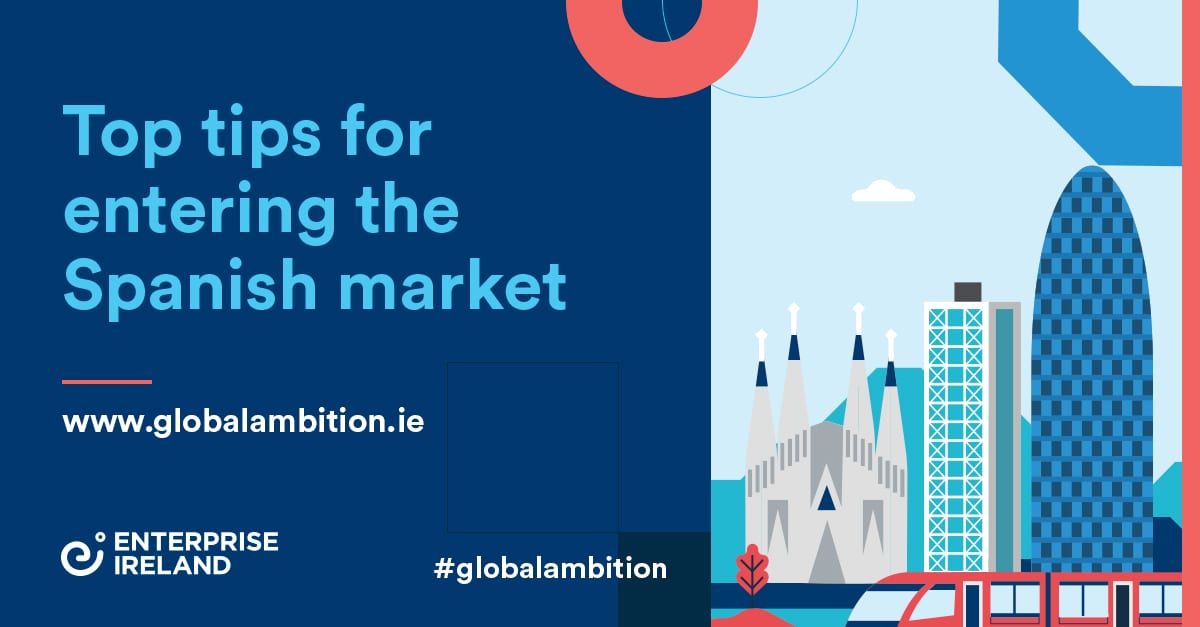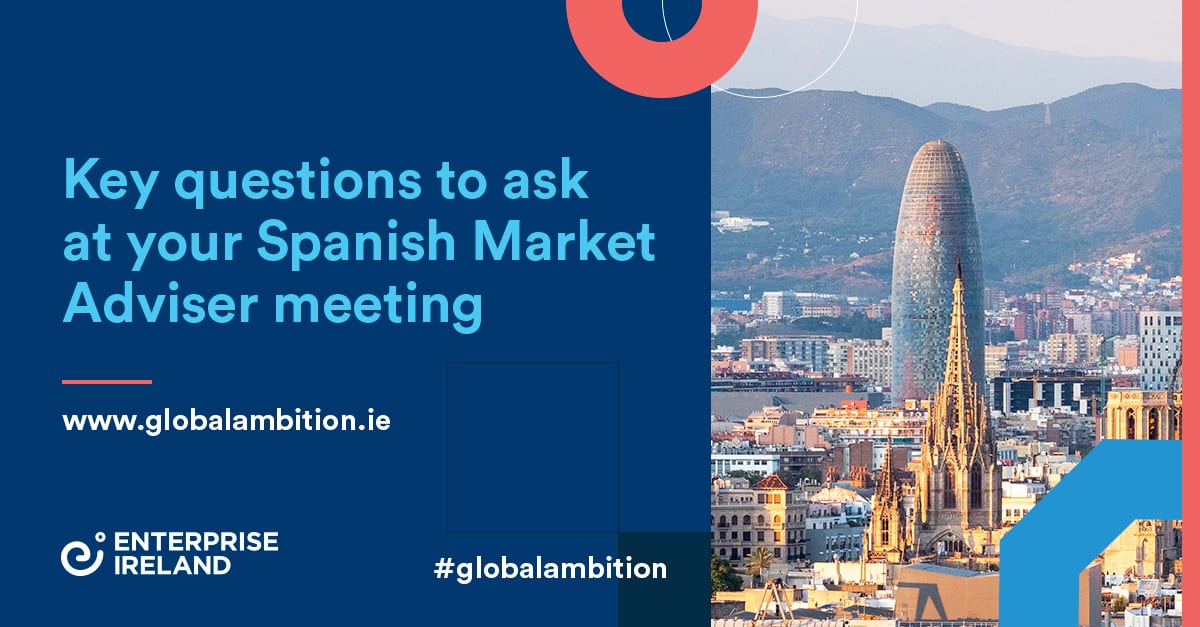Using market intelligence to inform your export plan
The saying that ‘knowledge is power’ is certainly true of successful exporting. Companies must understand their customers’ requirements, cultural considerations, market trends and what competitors in the market are doing, in order to succeed.
Insights gained from high-quality market research are essential for good business decisions for companies with the ambition to grow, export and, indeed, survive. While successful products and services are built on sound market research, a continual process of keeping up-to-date with business intelligence is required, which can be time-consuming and costly.
Market Research Centre
That is one reason Enterprise Ireland’s Market Research Centre is such a valuable resource. It is the largest repository of business intelligence in Ireland and contains thousands of world-class market research insights, available to Enterprise Ireland supported companies.
Reports include company, sector, market and country information, which help businesses to explore opportunities and compete in international markets. We use databases from blue-chip information providers such as Gartner, Frost & Sullivan, Mintel and others, which provide authoritative, verified information that is independent and reliable. Some of these reports cost tens of thousands of euro individually, so the value of accessing the service is immense.
Using market intelligence to assess new markets
The Market Research Centre is staffed by eight information specialists who help clients locate the most appropriate sources of knowledge for their requirements. The specialists can track down niche market intelligence that is not available through internet research and can also facilitate access to industry analysts to provide bespoke briefings that deep-dive into subject areas.
While the UK and European markets remain vitally important for exporters, increasingly diversification into more distant markets is a strategic option. Critical to all such business decisions is access to authoritative market research.
Using insights to make an impact
An example of how the centre helps companies to explore opportunities in overseas markets is workforce travel company Roomex. Over the last two years, the company has targeted the UK and Germany and is now looking at the huge potential of the US market. Information specialists helped the company gain valuable insights by providing access to global company, country, market and sector data which helped the Roomex to analyse their target customer and competitor base.
Enterprise Ireland’s research hub offers access to extensive predictive research on future trends, which is invaluable for companies interested in innovation. Knowledge of what might impact a market next provides an opportunity to develop new products or solutions. There are huge opportunities arising from disruptive technologies, such as driver-less cars, but also risks to companies which are not looking ahead
Growing your business
Companies which are serious about exporting, growing and future-proofing their business should put continuous research at the heart of their strategy. If your company is considering expanding into new markets the Market Research Centre’s extensive resources and expertise should be your first port of call.
Contact the Market Research Centre today.
Key questions to ask at your Singaporean Market Advisor meeting

Singapore, the gateway to SE Asia, is the regional business hub for ASEAN and the wider Asia Pacific region, providing stability and highly educated workforce, making it the perfect location to create a base.
If you are considering doing business in Singapore, please be sure to explore our top tips to enter the market below and also be sure to reach out to our team in Singapore
- What are the core sectors and what sectors should I avoid?
- Will I need a local partner company?
- What kind of obstacles should I expect when entering Singapore?
- What local competitors are active in this market?
- What social norms should I be cognizant of when engaging in meetings with local people?
- Will I need to set up an office in the region?
- Will I need to hire local staff?
- Can I relocate Irish staff in this region?
For more, please reach out to the Singapore region MA here and be sure to check out our Going Global Guide
If you would like to know what to prepare ahead of your first MA call, click the graphic below
Enterprise Ireland’s top tips for entering the Spanish and Portuguese markets
Historically pillars of trade, the Iberian nations of Spain and Portugal offer exceptional export opportunities to Irish companies
Home to the international powerhouses of Inditex, Banco Santander, BBVA, Ferrovial, and TAP (Transportes Aereos Portugueses), the purchasing power in this market, along with the cordial nature of the population, makes it a highly attractive export region. The team in Enterprise Ireland’s Madrid office are here to support you in entering this dynamic and growing market.
- Do your research. The Spanish and Portuguese populations combined amass to more than 10 times that of Ireland, while Iberia’s landmass is 7 times larger than Ireland’s. With more people, comes more business and innovation, and thus more competition. Really get to know the market you’re entering, and who you’ll be competing with.
- Create a great elevator pitch. Spanish and Portuguese businesses are more hierarchal in nature, and they like to work on equal terms, so make sure you are bringing your best to the table, as you can presume they are. A good elevator pitch that clearly explains who you are, what you do, and what you can offer is a great way of proving your interest and significance. First impressions and personal relationships are important here.
- Have a summarised value proposition. This is a highly price-sensitive market. Being price competitive will open the door to a consumer base of more than 50 million. However, having a good USP and a clear value proposition will help you to find a successful gap in the market. There is great purchasing power in Spain and Portugal, but you must find a way for your company to tap into it.
- Be aware of your distribution channel. If you intend to export to, or scale in this market, know how you will make that happen. Consider the steps that must be taken between your product/service in Ireland and your customer in Spain or Portugal. Assess the potential hurdles in providing your good or service to this market.
- You and/or your product need to speak the local language. Overcoming language barriers can be one of the most difficult aspects of exporting to this market. English levels vary significantly geographically and by sector. Having a trusted translator may be necessary for meetings and correspondence, which EI Madrid can help you with. More practically, your product itself must be accessible to the population you are selling to; an app that functions solely in English will not succeed in the wider population.
- Assess your resources. How can you make the most of the human and financial capital that you have? With a good business team and the backing of Enterprise Ireland, at home and in market, there is great potential for success when entering the Spanish and Portuguese market. Know your weaknesses and seek help from EI to develop them into strengths.
Enterprise Ireland is committed to helping Irish firms succeed in global markets and have experts on hand, ready to help you access the Spanish market.
Our Market Advisors are always available to support you and provide business expertise and on-the-ground knowledge.
For more, download our Going Global Guide.
If you would like to know what to prepare ahead of your first MA call, click the graphic below
Delmec makes data capture and sharing process more efficient
“People will have ideas, you have to give them the environment to throw them out there. The best ideas come from the people actually doing the work. The guys on the ground. Never ever squash an idea. You’ll never create a good culture doing that.”
– Damien Kelly, Head of Engineering & Innovation, Delmec.
Case Study: Delmec
Delmec, a global telecoms solutions company, headquartered in Carlow, was faced with a problem. Their engineers were recording data manually while doing survey work for tower owners and mobile network operators in Africa. It was leading to vast amounts of paperwork and it was unsustainable.
Head of Engineering and Innovation Damien Kelly explains: “It was a long drawn out process, our teams had to capture all the details on site, on paper. They’d then go back to the hotel or office, take photographs or scans of the survey and send it all to our design office, who had to try to read the information, model the tower, analyse it and write up a report.”
Handwritten data resulted in inconsistencies and the sharing of data post-survey led to delays.
Delmec had to find a way to make their data capture and sharing process more efficient. By doing so, they could speed up their operations and then scale the business. Enterprise Ireland’s Agile Innovation Fund was there to help.
Taking the leap
Delmec has a Telecoms Infrastructure Management system (TiMS). A cloud based assessment management system; it allows clients to monitor tower capacity, view
maintenance schedules and input trouble-tickets for thousands of telecommunications masts around the world. The company wanted to develop an app that would replace the old paper-based and manual way of working, and work in tandem with TiMS.
“The teams all had phones, we wanted to see if there was a way to automate things onsite and to capture the information digitally by tapping into the TiMS system,” Damien says. “We knew it was going to be a large undertaking. But we needed to jump on it because it was going to build the business for the next five to ten years.” he says. But there were doubts over changing familiar ways of working and the level of investment required. “We knew it was going to be a long journey and we needed buy-in from everyone to be able to do it,” Damien says.
A partner in change
After some research, Delmec signed up to a webinar to find out about Enterprise Ireland’s Agile Innovation Fund. The company liked what it saw and applied. The process from application to decision was quick, only taking four months to complete.
The application for the fund also helped Delmec map out the project. “Part of the application process involves scoping. By doing that, you’re then visualising what it is and you’re identifying problems,” he says.
“Enterprise Ireland holds your hand through the whole thing, there’s a lot of work but you’re not on your own,” Damien says.
Once the Agile Innovation Fund was secured, the internally-named ‘Eiffel’ project got underway. As with any app build, there were different iterations; it took eight months to complete its first stage.
A towering success
“It opened the floodgates to everything,” Damien says. Their design teams could access data in real-time and client partners were wowed by the speed of the process. The Agile Innovation Fund enabled Delmec to scale, they secured new contracts in Asia and the Middle East and they are now planning to expand to Europe.
The streamlined process means it can work with contractors in remote locations if needed. This proved to be essential when Delmec couldn’t dispatch their teams to towers due to local COVID-19 lockdowns. “If we didn’t have the app, I don’t know what position we’d be in now. We rely heavily on it,” Damien adds.
Delmec has built on the functionality of the app, moving it from a real-time data capture and sharing tool to something much more powerful. It not only drives efficiency throughout the entire business, it now drives ideas. The app tracks suggestions from team members who think something could be done better, everyone from accountants to engineers are encouraged to input.
The Eiffel project has also changed the mindset of the team. They have seen the benefits of embracing innovation and want to continue to evolve. It has given the business an edge over risk-averse competitors who are slow to embrace change.
How can other businesses nurture an innovative mindset? “People will have ideas, you have to give them the environment to throw them out there,” Damien says. “The best ideas come from the people actually doing the work. The guys on the ground. Never ever squash an idea. You’ll never create a good culture doing that.”
To find out more about Enterprise Ireland’s Agile Innovation Fund, contact your Development Advisor or call our R&D unit on 01 727 2120.
Digital communication – the key to success in North America in the context of Covid
The ongoing Covid-19 global pandemic has thrown up many challenges for companies worldwide. For Irish companies exporting to North America, these challenges have varied widely from sector to sector, but some, such as remote working, communication with clients, difficulties in finding new business, establishing sales pipelines and cash flow issues have been identified as common. As such, a basic roadmap to recovery has been drafted by Enterprise Ireland (EI) to help companies navigate through this uncertain time.
“The roadmap is a framework,” says Sean Davis, Regional Director for North America at EI, “but what’s interesting is that it extends across many, if not all sectors.”
There are three stages to the roadmap, and it’s backed up by EI supports to get companies into stages two and three:
- Stabilise – protect your business, maintain operations and retain employees
- Reset – adapt your business, plans and operations to new conditions
- Recover – Restart innovation and capitalise on early demand as recovery develops
Communication is key
One major issue that affects every stage of the framework is communication. Many companies found themselves scrambling to deal with a workforce that suddenly became remote. Face-to-face meetings became impossible, and in the North American market, different time zones and inability to travel became massive issues for Irish companies – and so setting up successful and secure online communication technologies became key.
Dr Martyn Farrows, COO of Soapbox Labs, explains that the communication issue is not just an internal problem, but also extends to your customers and potential clients. “For us, as an online business, we were very comfortable with using many of the technologies available to us, such as Slack, as we had already had them set up internally. That situation was put into very stark contrast with the market. Our business has a very regular 12-month rhythm as we do a lot of work with the education sector, so when this kicked off in February/March, we were right into our development phase and two very big customer networking events in North America were cancelled as a result of Covid. So we had to react very quickly as to how we could communicate with our clients and how we could support them as they adapt to a remote learning environment.”
But there are positives. Because this is a global problem, everyone has the same communication issue – and Sean explains that in a way it’s a great leveller for companies, as location becomes less of an issue when face-to-face meetings are not possible for anyone. “We also had a good call with Professor of Innovation and Entrepreneurship at the Kellogg School of Management, Northwestern University. Following research work with a large number of North American companies, the conclusion is that we’ve actually crossed the digital rubicon in terms of our movement towards digitalisation and this new virtual environment.
“Maybe one of the benefits of Covid has been that push of the technological envelope, leading companies to utilise technology in a more utilitarian way.”
Adapting your business
For every company, there is a real need to adapt to the new market conditions, and answer any individual challenges that present themselves to the company. John Power is the CEO & Managing Director of Aerogen, a company that manufactures the only product that delivers drugs via a closed-system aerosol on ventilated patients, so he experienced great demand as the crisis took hold. “In the second two and a half weeks of March we received orders equivalent to the orders received in the first half of last year. But that meant we had to ramp up our manufacturing at a time when the world in many ways was shutting down. For instance, a lot of our product is shipped globally on passenger planes but when they were grounded, we had to look for capacity on cargo planes. It was a very challenging time and we had to manage expectations to make sure everyone was getting what they needed to keep them going.”
For Martyn, too, there was a need to adapt quickly. “We have just launched a first-of-its-kind voice-powered assessment tool to help educators understand and accelerate literacy development for remote learners in the US. That is an interesting case study as we signed the contract in January 2020 for delivery in August 2021. In May, the customer floated the idea that they’d like to speed up development to bring it in this year to address needs created by Covid. Now there are 150,000 kids able to access that product for their learning, growing to 2 million in the next two years. This is a good example of needing to be agile, needing to adapt to your customer’s needs as they try to respond to the needs of the market.”
Both John and Martyn agree that the key to rising to such challenges is being sensitive to your staff’s needs, especially in such uncertain times when staff members may be dealing with virtual working challenges, stress and worry about illness, and children at home from school. “You have to manage things very carefully and set clear expectations,” says Martyn. “Our team has been amazing and adapted extremely well, but a lot of that is down to effective communication.”
Preparing for the future
While stabilising and adapting your business is key to survival, to keep trading once the crisis is over, preparation for the future is vital. And again, finding new ways to communicate is extremely important.
“In the medtech industry, our usual method of opening new accounts would be to meet the people and demonstrate our products,” says John. “Obviously that has been disrupted now as hospitals don’t want people coming off the street amid the restrictions. We’ve had to develop more online training, online webinars and keynote speeches to try and attract a pipeline for the future that way.”
Both Martyn and John agree that to succeed in the North American market, preparation and flexibility are needed. “We did a lot of research into the market and were fortunate to get a Market Discovery Fund grant approved through EI, which was pivotal for our entry into the market,” says Martyn.
“It’s all about preparation; there is no such thing as an overnight success in the US market.”
“Our modus operandi at EI over the past 30+ years has been to cultivate the client/buyer relationship,” says Sean.
“With the opening of our Montreal office, we will have eight offices across North America. I would advise any client company to get in contact with our local manager and market adviser for help during this time. We have had the same communication issues as our clients, but we’ve moved quickly to adapt so we can continue to nurture those client-buyer relationships.”
So what will be the future for Irish companies operating in North America? “At the start of this crisis, you couldn’t over-communicate, everyone wanted information,” says Sean. “But as it started to move through its different phases, we’ve moved more into trust and delegation. There will be a certain snap-back once we start to get back to normal and a certain amount of personal interaction will come back. On this point, there is a distinct difference between the US and Canada, as in Canada, those personal relationships are very important – which is why we have two offices there now.
“There has always been a cultural affinity between America and Ireland – but there are a lot of domestic NA companies that will be dusting themselves off and looking at the opportunities within the region – of which there are plenty – and they may be taking advantage of the huge markets on their doorstep to help them recover. That will be a future challenge for our clients.”










